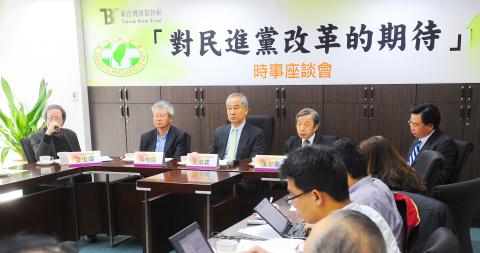The Democratic Progressive Party (DPP) needs to forget about the 2016 presidential race and focus instead on reforming the party and rediscovering the core ideals that made it popular with the Taiwanese public in the past, panelists said yesterday at a forum to discuss the future direction of the DPP.
“While winning the presidency is important, it is impossible for the DPP to return to power if all it thinks about is the elections, because it is now at a disadvantage because the political environment is dominated by a heavy Chinese influence,” political commentator Chin Heng-wei (金恆煒) said at the forum organized by the Taiwan Brain Trust think tank.
Chin said the DPP has always been more advanced and progressive than the Chinese Nationalist Party (KMT) in terms of its connections to social movements and its espousal of universal values, such as human rights.

Photo: Wang Min-wei, Taipei Times
However, the party lost the Jan. 14 presidential election because it lost touch with the public, Chin said, and not because of its stance toward China, as other commentators contend.
Chin said pursuing a strategy of developing closer ties with Beijing should never be on the DPP’s list of priorities.
“Regardless of how hard the DPP tries to appeal to Beijing, it will never defeat the KMT on cross-strait relations because the DPP will never be a ‘second KMT,’” he said.
Joseph Wu (吳釗燮), who served in the DPP administration of former president Chen Shui-bian (陳水扁) as Mainland Affairs Council chairman and representative to the US, agreed that cross-strait policy was not the reason the DPP lost the election.
If the DPP reaches that conclusion, the party will fall into a trap set by Beijing, Wu said.
“That is exactly what China wants you [the DPP] to think,” he said, adding that the DPP’s resolution on Taiwan’s future is “alive and kicking” and is able to meet any future challenges.
The DPP does not oppose closer engagement with China outright, but it insists that any exchanges should take place in a framework that safeguards Taiwan’s sovereignty and dignity. Former DPP chairperson Tsai Ing-wen (蔡英文) had listed the Strait Forum and the Western Taiwan Straits Economic Zone (海西經濟區) off-limits for DPP members, saying that they come with united front implications.
The DPP does not need to re-invent itself, Wu said. It simply needs to be a respectable opposition party and to keep hammering away on the issues it has traditionally cared about, such as the KMT’s ill-gotten party assets, media reform, judicial reform and fair elections.
The DPP should abandon the short-term goal of winning specific elections and devise a long-term vision and strategy, said Chang Yen-hsien (張炎憲), president of the Taiwan Association of University Professors.
Wu Shu-min (吳樹民), president of the pro-independence Taiwan Society, said the DPP needs to be confident in the values it believes in before it can win the public’s trust again.
“Perhaps we — civic organizations — should not be the DPP’s faithful cheerleaders so that the party is forced to carry out reforms and make changes,” Wu said.

Taipei has once again made it to the top 100 in Oxford Economics’ Global Cities Index 2025 report, moving up five places from last year to 60. The annual index, which was published last month, evaluated 1,000 of the most populated metropolises based on five indices — economics, human capital, quality of life, environment and governance. New York maintained its top spot this year, placing first in the economics index thanks to the strength of its vibrant financial industry and economic stability. Taipei ranked 263rd in economics, 44th in human capital, 15th in quality of life, 284th for environment and 75th in governance,

Greenpeace yesterday said that it is to appeal a decision last month by the Taipei High Administrative Court to dismiss its 2021 lawsuit against the Ministry of Economic Affairs over “loose” regulations governing major corporate electricity consumers. The climate-related lawsuit — the first of its kind in Taiwan — sought to require the government to enforce higher green energy thresholds on major corporations to reduce emissions in light of climate change and an uptick in extreme weather. The suit, filed by Greenpeace East Asia, the Environmental Jurists Association and four individual plaintiffs, was dismissed on May 8 following four years of litigation. The

A former officer in China’s People’s Liberation Army (PLA) who witnessed the aftermath of the 1989 Tiananmen Square massacre has warned that Taiwan could face a similar fate if China attempts to unify the country by force. Li Xiaoming (李曉明), who was deployed to Beijing as a junior officer during the crackdown, said Taiwanese people should study the massacre carefully, because it offers a glimpse of what Beijing is willing to do to suppress dissent. “What happened in Tiananmen Square could happen in Taiwan too,” Li told CNA in a May 22 interview, ahead of the massacre’s 36th anniversary. “If Taiwanese students or

The New Taipei City Government would assist relatives of those killed or injured in last month’s car-ramming incident in Sansia District (三峽) to secure compensation, Mayor Hou You-yi (侯友宜) said yesterday, two days after the driver died in a hospital. “The city government will do its best to help the relatives of the car crash incident seek compensation,” Hou said. The mayor also said that the city’s Legal Affairs, Education and Social Welfare departments have established a joint mechanism to “provide coordinated assistance” to victims and their families. Three people were killed and 12 injured when a car plowed into schoolchildren and their